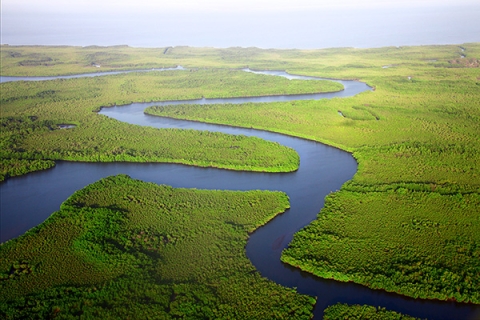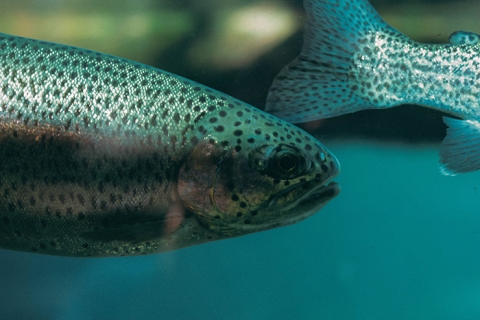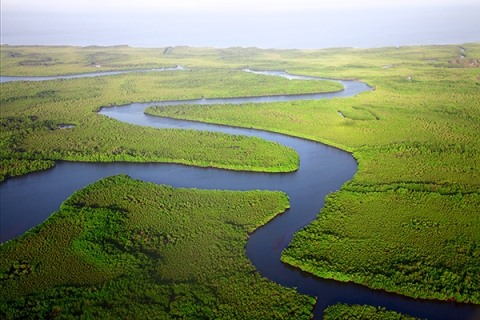

4 May 2020
3 min read
Inland fisheries are being overlooked by those shepherding the planet’s natural resources, according to new research.
The report authors say managing freshwater systems to protect inland fish and fisheries will produce substantial co-benefits to people and meeting the United Nation’s Sustainable Development Goals.
Their report is published in Nature Sustainability alongside an accompanying blog.
Inland fisheries help feed more than a sixth of the world’s population, employ millions of people and are worth an estimated £80 billion a year.
Ensuring the health of freshwater systems and inland fish also supports the people reliant on them for nutrition and livelihood, the study states.
One of the authors, Dr Sui Phang, is at the University of Portsmouth, UK, which has a long history in global fisheries research.
Inland fisheries are frequently undervalued or ignored compared with other sectors, such as agriculture, drinking water, power, sanitation, transportation and marine fisheries.
Dr Sui Phang, Centre for Blue Governance
He said: “Inland fisheries are frequently undervalued or ignored compared with other sectors, such as agriculture, drinking water, power, sanitation, transportation and marine fisheries. They have become the Cinderella of the natural world.
“Inland fish provide food for billions and livelihoods for millions of people worldwide and are integral to effective freshwater ecosystem function, but the problem is their value is often not recognised in development discussions and policies.
“The regions of the world that depend on inland fisheries are also the areas undergoing rapid economic development. It is vital we do not approach freshwater development the same way we did in the past, as single serving resources for hydropower or irrigation. A holistic approach that takes into account all services, like the use of fish for food, is needed.”
The pursuit of economic development often conflicts with environmental health. In some countries, particularly in the African and Asian continent where economic growth is rapid, freshwater fish is also major protein source and an important source of regular seasonal employment for millions of people.
The study translates the value of the world’s inland fish and fisheries into policy relevant language for greater integration in decision-making.

Freshwater systems are home to nearly half the world’s fish CREDIT Chris Bair Unsplash
The researchers looked at the relationships between inland fish, sustainable fisheries and functioning freshwater systems and lined them up against the UN sustainable development goals.
Freshwater systems are also home to nearly half the world’s fish species.
“The United Nation’s Sustainable Development Goals are the global roadmap used by countries to achieve the ‘future we want’. This future must include the services provided by freshwater fish and so we show their importance using the language decision makers are more familiar with.”
Inland fish in lakes, rivers, estuaries, wetlands, reservoirs, ponds and fish farms are of global economic, social, and ecological importance, including through employing about 58 million people and being valued at £80bn. More than 40 per cent of all fish species are found in freshwater systems.
Inland fisheries were found to be low on the global agenda.
The United Nation’s Sustainable Development Goals include reducing poverty and hunger, having clean water and sanitation, and fostering responsible food consumption and production, all of which, the study argues, inland fisheries contribute to.
As a result, the threats to inland fish, fisheries and habitats may play second fiddle to the rest of the natural world’s resources, and any problems they face addressed only after the needs of other natural resources have been satisfied.
“Inland fishery services make a substantial contribution to food security, poverty alleviation, livelihoods, human well-being and ecosystem function,” Dr Phang said. “By not recognising and valuing the immense benefits of a large unsung resource, we also risk storing up problems later, such as costs of subsidies to replace them if they’re lost.”

Inland waterways: Low on the global agenda
The study breaks down the value of inland fisheries into two groups, well-being (commercial income; food and nutrition; livelihoods and subsistence income; recreational services); and services (cultural services; ecosystem function and biodiversity; educational and scientific opportunities; regulation of freshwater quality and quantity, flow timing, and variability).
The authors hope that clustering the benefits into two clear groups will help governments, development agencies and aid organisations realise the importance and need to protect the resource.
The research was carried out by Dr Phang and colleagues at the United States Geological Survey, Smithsonian Institution, Fisheries Conservation Foundation, Conservation International, Shedd Aquarium, the Universities of Washington and Florida.
